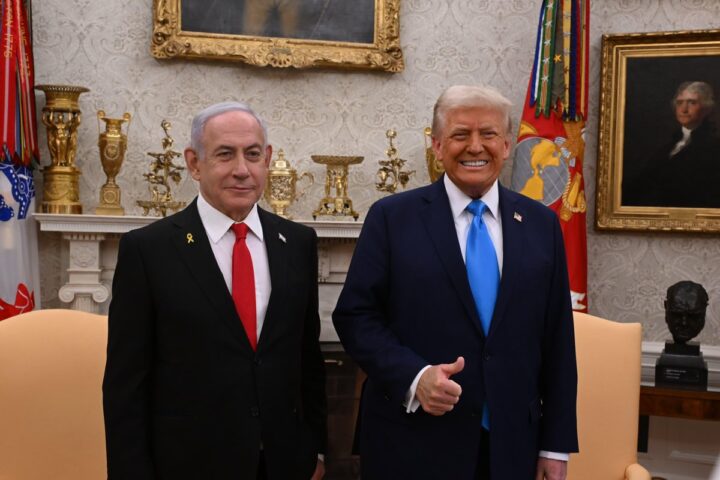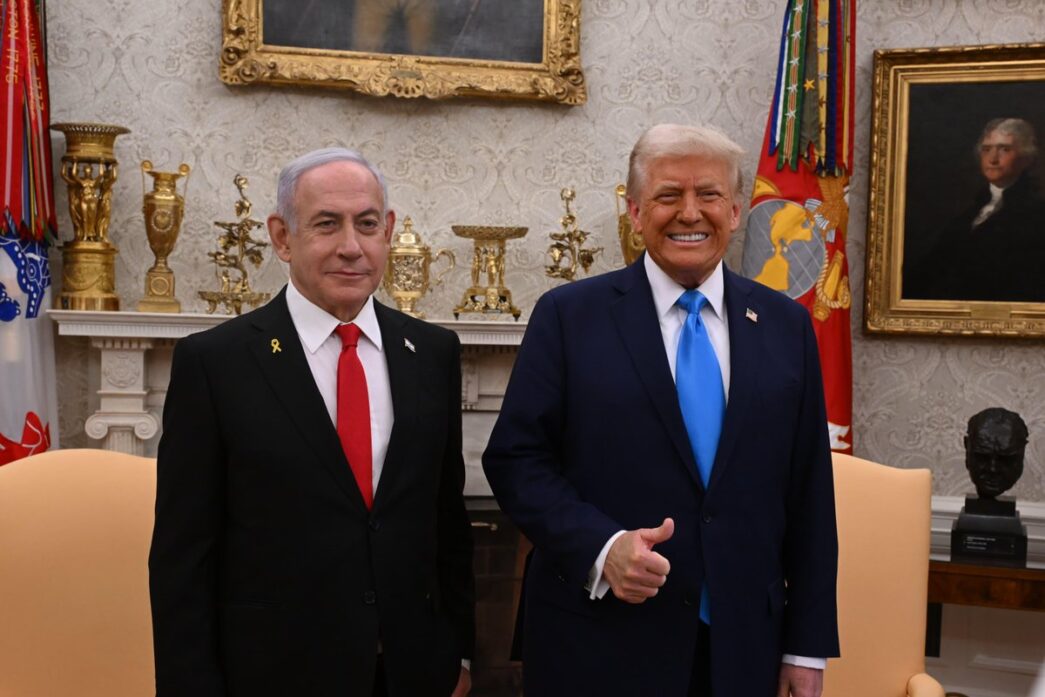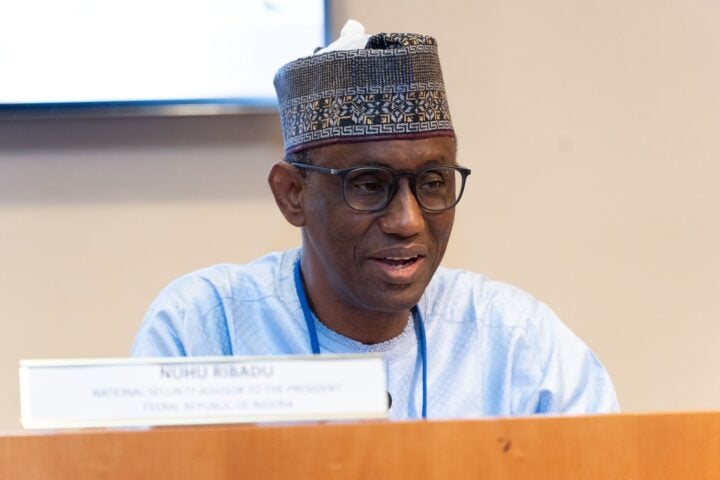A file picture of Israeli Prime Minister Benjamin Netanyahu (left) and US President Donald Trump
As Donald Trump returns to the White House, his approach to the Middle East crises, especially concerning Gaza, demands a careful consideration, and a heavy dose of caution. He has come out to openly signal his intention to engineer a direct U.S. or allied takeover of Gaza to stabilize the region. And that raises serious strategic, diplomatic, and geopolitical risks if he should press ahead with the plan.
US President Donald Trump said during a joint press conference with Israeli Prime Minister Benjamin Netanyahu at the White House on February 5, “The US will take over the Gaza Strip, and we will do a job with it, too”. Trump envisioned the Strip which he wants the US to own and develop.
The Palestinians living in Gaza should move to neighboring countries with “humanitarian hearts” and “great wealth”, Trump added. Meanwhile, let us examine some possible outcomes, in the event of an eventual takeover of the Gaza Strip:
One; Any occupation of Gaza by an external force, whether by the U.S. or its allies, risks igniting a broader conflict in the Middle East. The region remains highly volatile, with deep-seated tensions between Israel and Palestinian factions, as well as among Arab states. A direct interference could provoke a backlash from key U.S. partners like Egypt, Jordan, and Saudi Arabia, who have expressed firm opposition to forced displacement, or foreign military control in Gaza.
Advertisement
Trump has positioned himself as a dealmaker in the region, brokering the Abraham Accords during his first term. A heavy-handed Gaza policy could undo that progress, alienating potential allies and complicating future peace negotiations.
Secondly, any kinetic intervention in Gaza, would require significant military and financial commitments. The U.S. is already stretched thin with its support for Ukraine, Taiwan, and other global security concerns. A long-term American or allied presence in Gaza could lead to another costly and prolonged engagement, reminiscent of Iraq and Afghanistan—scenarios Trump himself has criticized.
Moreover, with growing domestic concerns over inflation and public debt, a large-scale military operation or occupation would face opposition from both Congress and American voters, many of whom support a more restrained foreign policy. A clear indication of that was evident in revelation by a US congressman, Rep Scott Perry who alleged that US Taxpayers’ money, running into millions might have inadvertently been used in financing terrorists groups like ISWAP, Al-Qaeda, and even, Nigeria’s own domestic security challenge — Boko Haram. This is an indication that institutions on the home front, as key as the Congress, could stand in the way of any reckless foreign policy that would put a strain on the US economy.
Advertisement
Thirdly, Arab nations, including Saudi Arabia, the UAE, and Egypt, who are critical partners for U.S. influence in the Middle East, would not find such a move tolerable. While these countries have normalized relations with Israel or expressed willingness to engage, they strongly oppose forced resettlement or external control over Gaza.
If Trump pushes too aggressively for a U.S.-backed Gaza takeover, he risks undermining future regional agreements. He also risks extinguishing the faith of the Arab world in whatever America claims to represent or stand for in the region. Therefore, instead of forcing a solution, he should leverage Arab nations to take a leadership role in Gaza’s reconstruction, ensuring regional buy-in rather than imposing an outside solution that could be considered neocolonialism.
The fourth and most probable consequence is for such a move to irrigate Iran’s resentment and general anti-US sentiments in the region. A direct U.S. role in Gaza could play into Iran’s hands, allowing it to rally its proxies—Hezbollah, the Houthis, and even factions within Iraq and Syria—against American forces. Tehran has used past U.S. interventions to justify its own military expansion and propaganda efforts. If Trump seeks to maintain U.S. influence in the Middle East, avoiding unnecessary escalations that fuel Iran-backed resistance is essential.
Then, the fifth and most critical consequence is that, to do this (take over the Gaza Strip) by force would be a grave violation of international law. In such a case, it remains to be seen, how the international community would react to this seemingly reckless choice by Trump.
Advertisement
Instead of the rash, greed-driven decision (remember, Trump is a property developer) to directly take over the territory, and threatening not to allow hundreds of thousands of displaced Palestinians return to their ancestral land, a pragmatic Approach for Trump’s Middle East Strategy is strongly advised.
Rather than a risky direct intervention, Trump should focus on pragmatic diplomacy.
If Trump wants to maintain U.S. influence in the Middle East, he must navigate this issue cautiously. A better approach would involve:
1. Encouraging Arab-Led Solutions: Engaging Egypt, Saudi Arabia, and the UAE in overseeing Gaza’s reconstruction and governance, preventing a vacuum that extremists could exploit.
2. Balancing Israeli Security with Palestinian Governance: Working toward a governance framework that ensures Israel’s security while granting Palestinians a high (if not absolute) level of self-rule. Failure to entrench a functional machinery of government in Palestine, with a group like Hamas given a role to play, would make it very difficult, if not impossible, to hold anybody in charge of the administration, responsible. Hamas would never be under any sort of obligation to behave more responsibly in accordance with international laws, if it’s not given the responsibility to form a part of the government. But once that is done, the leadership of the group would be answerable to the various international laws governing the conduct of governments across the globe. This is because whether the US or Israel like it or not, the people of Gaza prefer the leadership of Hamas in Gaza. This much was eloquently stated in the last legislative council election held in 2006 in which the group received 44.45% of the vote and won 74 of the 132 seats, whilst the ruling Fatah received 41.43% of the vote and won 45 seats.
Advertisement
3. Avoiding a Costly Military Commitment: Keeping U.S. forces out of direct involvement while using diplomatic pressure and economic incentives to shape outcomes.
In conclusion, therefore, a hasty Gaza takeover would do more harm than good, both for regional stability and U.S. interests. If Trump wants to sustain American relevance in the Middle East, he must prioritize diplomacy over direct intervention.
Advertisement
Abubakar writes from Ilorin, Kwara state. He can be reached via 08051388285 or [email protected]
Advertisement
Views expressed by contributors are strictly personal and not of TheCable.












